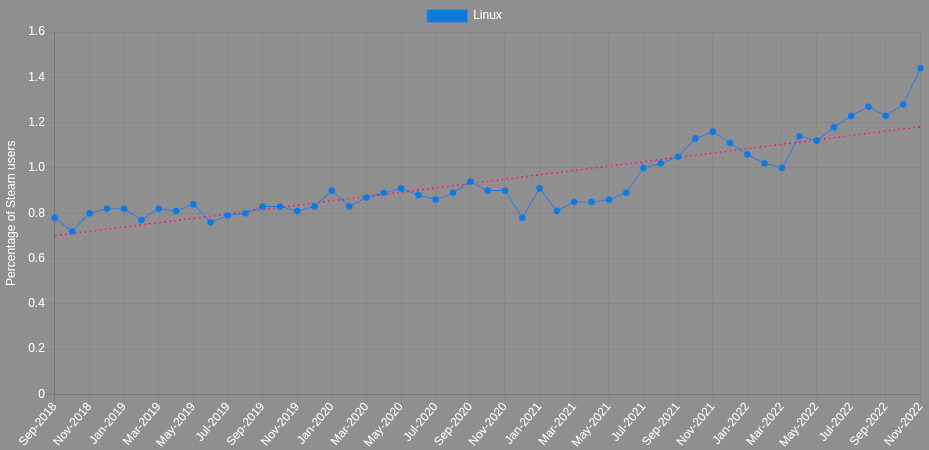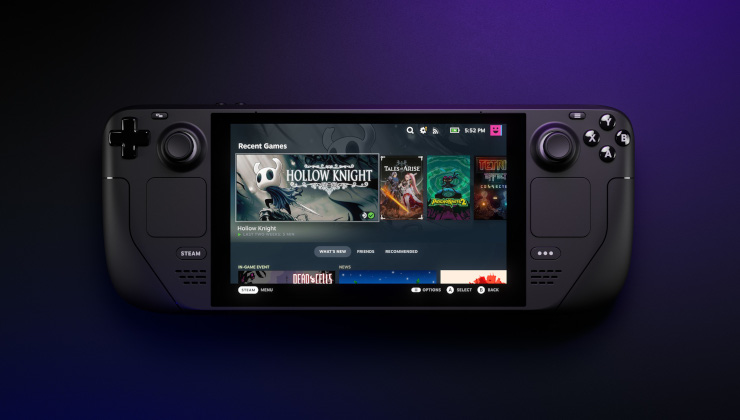November is over which means a fresh Steam Hardware Survey, and it continues the trend we've been seeing with the Linux user share rising and now it's bigger than ever.
At the end of November, Linux hit 1.44% on Steam against 2.45% on macOS and 96.11% on Windows. Going by our Steam Tracker, where we've been tracking the Linux user share for a few years, it has hit another all-time high. The usual caveat of course: tiny compared to Windows, but the trend towards Linux is clearer than ever.
This growth is easy to see is largely down to the Steam Deck, with SteamOS 3 being clearly the most popular way to play games on a Linux system now:
- SteamOS Holo 64 bit 25.77% + 0.79%.
- Ubuntu 22.04.1 LTS 64 bit 10.89% - 1.38%.
- Arch Linux 64 bit 9.37% + 0.25%.
- Manjaro Linux 64 bit 6.72% - 0.20%.
- Freedesktop.org SDK 22.08 (Flatpak runtime) 64 bit 5.82% + 0.11%.
- Linux Mint 21 64 bit 3.90% + 3.90%.
- Pop!_OS 22.04 LTS 64 bit 3.71% + 3.71%.
- Other 33.81% - 7.18%.
Unsurprisingly, the Steam Deck is also the biggest device as a whole for Linux gaming with the AMD Custom GPU 0405 taking 25.77% + 0.76% with the next most popular being the AMD Radeon RX 480 3.75% - 0.15%. It's also interesting to see that SteamOS and the Steam Deck GPU percentages match in the Linux data, along with it not showing up on the Windows data at all making Windows on Steam Deck a tiny minority.
Edit: as also pointed out rightly so in a comment, since the Deck GPU shows up now in the combined platform data for all of Steam (AMD Custom GPU 0405 0.37% + 0.05%), we can see that nearly all are on SteamOS.
It's also interesting to see that SteamOS and the Steam Deck GPU percentages match in the Linux data, making Windows on Steam Deck a tiny minority.
We can compare them directly now that the Deck GPU shows up in the global stats. The Decks represent 0.37% of the machines sampled for the survey (from the GPU list), and SteamOS is the OS for 0.371% of the machines sampled (it's weird that Valve don't list SteamOS directly on the front page). The number of people sampled running Windows on the Deck must be narrowly edged out (to the tune of 0.001%) by people running SteamOS on something that isn't the Deck, with both being essentially nil because of the number of people running SteamOS on something other than the Deck not being big enough to show up in the Linux stats, as you point out in the article.
You're quite right, my focus was specifically on Windows and Linux since it didn't show up elsewhere before but being in the main combined stats certainly helps us see that! Surprised I missed it initially heh.It's also interesting to see that SteamOS and the Steam Deck GPU percentages match in the Linux data, making Windows on Steam Deck a tiny minority.
We can compare them directly now that the Deck GPU shows up in the global stats. The Decks represent 0.37% of the machines sampled for the survey (from the GPU list), and SteamOS is the OS for 0.371% of the machines sampled (it's weird that Valve don't list SteamOS directly on the front page). The number of people sampled running Windows on the Deck must be narrowly edged out (to the tune of 0.001%) by people running SteamOS on something that isn't the Deck, with both being essentially nil because of the number of people running SteamOS on something other than the Deck not being big enough to show up in the Linux stats, as you point out in the article.
Last edited by Liam Dawe on 2 Dec 2022 at 10:12 am UTC
The Steam Deck was one of Valve's smartest moves in years, absolutely genius strategy to penetrate the PC OS market with a Linux PC wearing the disguise of a handheld gaming device. And it's working so damn well.
At this rate I'm very much so hoping we could see 2% possibly as soon as this time next year. We could very well see Linux beating MacOS by 2024. It's been a long road, and there's still a lot more road to go, but it's certainly been a fantastic year for Linux gaming.
That's very good numbers. I'm looking forward for January numbers early next year, now the Deck starts shipping in Japan, that should be very interesting :)Also - christmas is coming
We can compare them directly now that the Deck GPU shows up in the global stats. The Decks represent 0.37% of the machines sampled for the survey (from the GPU list)An interesting figure in itself. So like, Linux is at 1.44%. And Steam Decks, almost entirely running Linux, are 0.37% (and climbing). So that means Linux without Steam Deck is 1.07%, and the Steam Deck represents just over a quarter of total Linux use on Steam.
At this point, the Deck is already giving Linux use a substantial boost. And as I understand it, for the first few months of release sales were significantly constrained by manufacturing capacity; they're faster now. If sales continue at the present rate, that's probably at least 0.5% per year and quite likely more. Which, put like that, doesn't sound like a whole lot--but it agrees with Gradyvuckovic's take that Steam Deck could take Linux Steam usage over Mac by 2024.
It's certainly way faster growth than Linux gaming has ever seen.
Makes me wonder about, not just copycats, but other experiments with Linux-based hardware that might not even involve gaming as a focus. I mean, Valve just demonstrated that you can successfully make a thing that runs Linux, that is user friendly, and that nobody switches the OS on to Windows even though in theory they could and one thing that has always seemed particularly hard to do on Linux is games. Companies may start to think, if you can do that, you could put Linux on any hardware and hope to succeed in selling it. You could make Chromebook-alikes with real Linux on them. You could make tablets as anime-themed merch. Who knows? The example of the Steam Deck's success could spark the growth of a wider Linux-hardware ecosystem.
Last edited by Purple Library Guy on 2 Dec 2022 at 5:45 pm UTC
An interesting figure in itself. So like, Linux is at 1.44%. And Steam Decks, almost entirely running Linux, are 0.37% (and climbing). So that means Linux without Steam Deck is 1.07%, and the Steam Deck represents just over a quarter of total Linux use on Steam.(Note that this is a bounce-back month - the figures last month showed teeny tiny growth despite China's Windows usage being heavily weighted in the stats. The trends are indicative, but the specific numbers for growth this month are probably a little high)
SteamOS grew 0.05 percentage points this month, but Linux as a whole grew 0.16 percentage points. That's 0.11 percentage points of growth of Linux, excluding the direct contribution of people being shipped Steam Decks. Obviously a big part of that is having the enhanced visibility and attention that comes with having the Deck as a popular halo device, but it's obviously much healthier for us to not have our growth only directly from a single device. Hopefully the growth of Linux will continue to outpace the shipments of the Deck as more and more people get the opportunity to say, "wow, I had no idea Linux was this good."
Last edited by CatKiller on 2 Dec 2022 at 6:30 pm UTC
[Link to imgur](https://imgur.com/xptkQkj)
I annotated the timeline with SteamDeck announcement and Release and added the trendlines shown, when filtering to the specific timeframes (always including the moments, so there's 1 month of overlap).
Wanted to add the Proton release, but there is no data pre-Proton, anyway :D
You can clearly see the spike in people trying out Linux after the announcement (+LTT coverage) that lost momentum early 2022. Next months will indeed be very interesting...
Last edited by const on 2 Dec 2022 at 6:48 pm UTC
An interesting figure in itself. So like, Linux is at 1.44%. And Steam Decks, almost entirely running Linux, are 0.37% (and climbing). So that means Linux without Steam Deck is 1.07%, and the Steam Deck represents just over a quarter of total Linux use on Steam.(Note that this is a bounce-back month - the figures last month showed teeny tiny growth despite China's Windows usage being heavily weighted in the stats. The trends are indicative, but the specific numbers for growth this month are probably a little high)
SteamOS grew 0.05 percentage points this month, but Linux as a whole grew 0.16 percentage points. That's 0.11 percentage points of growth of Linux, excluding the direct contribution of people being shipped Steam Decks. Obviously a big part of that is having the enhanced visibility and attention that comes with having the Deck as a popular halo device, but it's obviously much healthier for us to not have our growth only directly from a single device. Hopefully the growth of Linux will continue to outpace the shipments of the Deck as more and more people get the opportunity to say, "wow, I had no idea Linux was this good."
What is the current Linux marketshare? 2.5 i think?
What is the current Linux marketshare? 2.5 i think?
At the end of November, Linux hit 1.44% on Steam against 2.45% on macOS and 96.11% on Windows.Although it's 3.5% of the English-speaking Steam user base.
What is the current Linux marketshare? 2.5 i think?
At the end of November, Linux hit 1.44% on Steam against 2.45% on macOS and 96.11% on Windows.Although it's 3.5% of the English-speaking Steam user base.
sorry i meant linux in general and not steam only.
What is the current Linux marketshare? 2.5 i think?That seems about right. Here's an overview from November 2022:
- Statcounter: Linux occupies 2.6% of the market share compared to 15.74% for macOS and 75.93% for Windows.
- W3Schools: As of October 2022, Linux has a grip on 4% of the market share, compared to 9.8% of macOS and 70.4% of Windows.
- Steam Survey: In terms of desktop gaming, Linux has a market share of 1.28% (Ubuntu, Arch, Manjaro as the top-three) when compared to 2.23% for macOS and 96.50% for Windows.
- Statista (last updated on June 2022): The Linux desktop market share was 2.42% when compared to 14.64% for macOS, and 76.33% for Windows.
- Stack Overflow Survey: Among the developers who participate in the Stack Overflow survey, 40.23% of users use the Linux-based operating system for personal use, and 39.89% of those use it for professional use.
Stolen from [itsfoss.com](https://itsfoss.com/linux-market-share/)
We can compare them directly now that the Deck GPU shows up in the global stats. The Decks represent 0.37% of the machines sampled for the survey (from the GPU list)An interesting figure in itself. So like, Linux is at 1.44%. And Steam Decks, almost entirely running Linux, are 0.37% (and climbing). So that means Linux without Steam Deck is 1.07%, and the Steam Deck represents just over a quarter of total Linux use on Steam.
At this point, the Deck is already giving Linux use a substantial boost. And as I understand it, for the first few months of release sales were significantly constrained by manufacturing capacity; they're faster now. If sales continue at the present rate, that's probably at least 0.5% per year and quite likely more. Which, put like that, doesn't sound like a whole lot--but it agrees with Gradyvuckovic's take that Steam Deck could take Linux Steam usage over Mac by 2024.
It's certainly way faster growth than Linux gaming has ever seen.
It should be sooner than that. You are counting 0.5% per year, but Steam Deck sales at the beginning of this year wasn't as big, so the 0.5 figure isn't accurate. If we go by October's numbers: (2.45 - 1.44) / (1.44 - 1.28) = 7 months or so. So, if the current pace continues we should see Linux overtaking macOS in July 2023.
Probably you're right. But, well, I figure that the pace isn't really reliable, and any figures we might derive from the hardware survey are subject to a certain amount of random jitter, and I'd rather make my predictions err on the conservative side so I can be pleased when they're exceeded than have them overoptimistic and then be sad when things don't turn out that well.We can compare them directly now that the Deck GPU shows up in the global stats. The Decks represent 0.37% of the machines sampled for the survey (from the GPU list)An interesting figure in itself. So like, Linux is at 1.44%. And Steam Decks, almost entirely running Linux, are 0.37% (and climbing). So that means Linux without Steam Deck is 1.07%, and the Steam Deck represents just over a quarter of total Linux use on Steam.
At this point, the Deck is already giving Linux use a substantial boost. And as I understand it, for the first few months of release sales were significantly constrained by manufacturing capacity; they're faster now. If sales continue at the present rate, that's probably at least 0.5% per year and quite likely more. Which, put like that, doesn't sound like a whole lot--but it agrees with Gradyvuckovic's take that Steam Deck could take Linux Steam usage over Mac by 2024.
It's certainly way faster growth than Linux gaming has ever seen.
It should be sooner than that. You are counting 0.5% per year, but Steam Deck sales at the beginning of this year wasn't as big, so the 0.5 figure isn't accurate. If we go by October's numbers: (2.45 - 1.44) / (1.44 - 1.28) = 7 months or so. So, if the current pace continues we should see Linux overtaking macOS in July 2023.
Makes me wonder about, not just copycats, but other experiments with Linux-based hardware that might not even involve gaming as a focus. [...] You could make Chromebook-alikes with real Linux on them. [...] Who knows? The example of the Steam Deck's success could spark the growth of a wider Linux-hardware ecosystem.This sorta happened before with netbooks over a decade ago: https://web.archive.org/web/20090305075848/http://www.pcworld.com/article/160567/think_linux_rules_on_netbooks_think_again.html
In the end, most manufacturers of the ill-fated netbook switched over to Windows. Predominantly because Microsoft offered Windows licenses for less than they do on more powerful devices. Which makes me wonder why manufacturers like ASUS, HP, Acer and like would switch from ChromeOS to a GNU/Linux distribution. As far as I can tell, ChromeOS doesn't have a licensing fee, so GNU/Linux has no advantage over it there.
It would be nice, but I think OEMs find Google's brand name reassuring and don't see a reason beyond a programming audience to choose a GNU/Linux operating system like Ubuntu.
In the end, most manufacturers of the ill-fated netbook switched over to Windows. Predominantly because Microsoft offered Windows licenses for less than they do on more powerful devices.Microsoft made Windows free for those OEMs (while forcing an insipid specs list that would ensure netbooks lost out to tablets), and had a concerted FUD campaign about customer hostility to Linux.











 2 Dec 2022
2 Dec 2022
 How to set, change and reset your SteamOS / Steam Deck desktop sudo password
How to set, change and reset your SteamOS / Steam Deck desktop sudo password How to set up Decky Loader on Steam Deck / SteamOS for easy plugins
How to set up Decky Loader on Steam Deck / SteamOS for easy plugins
See more from me